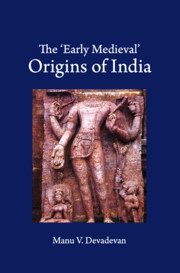Book contents
- Frontmatter
- Dedication
- Contents
- List of Tables
- List of Maps and Figures
- Acknowledgements
- 1 Introduction
- I INSTITUTIONS
- 2 State Formation and Its Structural Foundations
- 3 From the Cult of Chivalry to the Cult of Personality: The Seventh- Century Transformation in Pallava Statecraft
- 4 Changes in Land Relations and the Changing Fortunes of the Cēra State
- 5 Temple and Territory in the Puri Jagannātha Imaginaire
- II IDEAS
- 6 Svayaṃbuddha's Predilections: The Epistemologies of Time and Knowledge
- 7 Bhāravi and the Creation of a Literary Paradigm
- 8 Knowing and Being: The Semantic Universe of the Kūḍiyāṭṭaṃ Theatre
- 9 The Invention of Zero and Its Intellectual Legacy
- III IDENTITIES
- 10 The Evolution of Vernacular Languages: A Case Study of Kannada
- 11 Religious Identities in Times of Indumauḷi's Grief
- 12 Caste, Gender, and the Landed Patriarchy
- 13 The Making of Territorial Self Consciousness (with Particular Reference to Kaliṅga)
- Bibliography
- Index
1 - Introduction
Published online by Cambridge University Press: 02 May 2020
- Frontmatter
- Dedication
- Contents
- List of Tables
- List of Maps and Figures
- Acknowledgements
- 1 Introduction
- I INSTITUTIONS
- 2 State Formation and Its Structural Foundations
- 3 From the Cult of Chivalry to the Cult of Personality: The Seventh- Century Transformation in Pallava Statecraft
- 4 Changes in Land Relations and the Changing Fortunes of the Cēra State
- 5 Temple and Territory in the Puri Jagannātha Imaginaire
- II IDEAS
- 6 Svayaṃbuddha's Predilections: The Epistemologies of Time and Knowledge
- 7 Bhāravi and the Creation of a Literary Paradigm
- 8 Knowing and Being: The Semantic Universe of the Kūḍiyāṭṭaṃ Theatre
- 9 The Invention of Zero and Its Intellectual Legacy
- III IDENTITIES
- 10 The Evolution of Vernacular Languages: A Case Study of Kannada
- 11 Religious Identities in Times of Indumauḷi's Grief
- 12 Caste, Gender, and the Landed Patriarchy
- 13 The Making of Territorial Self Consciousness (with Particular Reference to Kaliṅga)
- Bibliography
- Index
Summary
It has been a typical practice since the nineteenth century to classify the course of Indian history into three successive chronological periods, the ancient, the medieval, and the modern. The ideational lines along which Indian historiography developed in the first half of the twentieth century, with the national movement as its context, has earned this frame of reference wide approval and acceptance. The three time periods figure in popular conceptions in India today as facts of history and not so much as analytical categories. And like all systems of faith, it has attained a reified truth-value that is independent of the specific history that brought it into being in the first place.
In calling a leading historiographical paradigm a system of faith, we do not propose to contest its status as knowledge. All that we are suggesting is that in its pursuit for historical truths, the paradigm functioned more with the persistence of faith than with the sagacity that established systems of knowledge call for. The chronological division of Indian history into the ancient, the medieval, and the modern has in the course of time attained the quality of an article of faith.
This classification has no basis in processual historical developments. It has also little to do with die-hard narratives of events and political intrigues, à la Robert Graves, that passes off as history in the popular imagination. The ancient, the medieval, and the modern are defined in terms of the faith and values of the dominant rulers of the respective epochs. Thus, the ancient period belongs to the Hindu rulers, the medieval to the Muslim rulers, and the modern to the British rulers and their secular and not-so-secular successors in independent India. James Mill was the first to propose this threefold chronology. In his influential 1817 book, The History of British India, Mill divided the history of the subcontinent into the Hindu, the Muslim, and the British phases, the details of which are well known and need not be rehearsed here. Mill never visited India. He knew no Indian language either. But as a work that advocated the cause of British imperialism in India, his book had an advantage that few early nineteenth century works of a comparable scale had had. The History of British India was for several decades a textbook at Haileybury, where would-be civil servants in India underwent their administrative training.
- Type
- Chapter
- Information
- The ‘Early Medieval' Origins of India , pp. 1 - 26Publisher: Cambridge University PressPrint publication year: 2020



